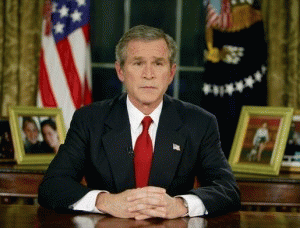Reprinted from Consortium News

President George W. Bush announcing the start of his invasion of Iraq on March 19, 2003.
(Image by YouTube (Screenshot)) Details DMCA
Not since the eve of the U.S. invasion of Iraq has Official Washington's political/punditry class clamored more single-mindedly -- and openly -- for the U.S. government to commit a gross violation of international law, now urging a major military assault on the government of Syria while also escalating tensions with nuclear-armed Russia.
And, like the frenzied war fever of 2002-2003, today's lawless consensus is operating on a mix of selective, dubious and false information -- while excluding from the public debate voices that might dare challenge the prevailing "group think." It's as if nothing was learned from the previous disaster in Iraq.
Most notably, there are two key facts about Syria that Americans are not being told: one, U.S. regional "allies" have been funding and arming radical jihadist groups, including Al Qaeda terrorists, there almost since the conflict began in 2011 and, two, the claim about "moderate" Syrian rebels is a fraud; the "moderates" have served essentially as a P.R. cut-out for the U.S. and its "allies" to supply Al Qaeda and its allies with sophisticated weapons while pretending not to.
For Americans who may find those two points hard to believe, they should remember that the United States and Saudi Arabia went in 50/50 with billions of dollars to finance the jihadist mujahedeen in Afghanistan in the 1980s, viewing these religious fanatics as a useful "tip of the spear" to kill Soviet troops who were defending the leftist secular regime then governing in Kabul.
That exercise in U.S.-Saudi realpolitik gave birth to the modern jihadist movement, bringing together a network of foreign jihadists, led by Saudi Arabia's Osama bin Laden (which morphed into Al Qaeda), with Afghan/Pakistani extremists who evolved into the Taliban.
Though U.S. officials eventually came to fear this Frankenstein monster that they had helped create, Saudi intelligence continued to work with Al Qaeda and its affiliates, using them as a kind of international paramilitary force to punish Saudi enemies, particularly Shiite-dominated governments, from Iran to Syria to now Iraq.
The Saudis also began collaborating with Israel, which shared Riyadh's view that Iran and the "Shiite crescent" represented a strategic threat. Between Saudi money and Israeli political clout, the two countries could fend off occasional fits of U.S. anger, even to the point of getting the U.S. government to hide a 29-page chapter about Saudi financing for the 9/11 hijackers from the congressional 9/11 report for a dozen years.
For the past five years, the principal target of this powerful coalition has been Syria, with President Obama occasionally joining in -- as he did in authorizing "covert" CIA and Pentagon programs to arm "moderate" rebels -- and occasionally bowing out -- as he did in resisting pressure to bomb the Syrian military after a mysterious sarin gas attack outside Damascus on Aug. 21, 2013.
In summer 2014, when Al Qaeda's spin-off, the Islamic State, began beheading Western hostages, Obama authorized bombing inside Syria but only against the Islamic State, which also had overrun large sections of Iraq and threatened the Shiite-dominated regime in Baghdad. (Obama's bombing inside Syria was not authorized by the Syrian government so it was illegal under international law but Syria didn't press the point as long as the U.S. coalition was attacking forces regarded as terrorists.)
New U.S. Hysteria
This more complex reality is completely missing in the new round of political/press hysteria in the United States. The neocons and their liberal-hawk sidekicks only talk about stopping the "barbarism" of the Syrian government and its Russian allies as they try to finally wipe out Al Qaeda's jihadists and their "moderate" allies holed up in eastern Aleppo.
Many of these calls for a U.S. military intervention against the Syrian government (and the Russians) are coming from the same advocates for war who created the misguided consensus for invading Iraq in 2002-2003, voices such as Sen. John McCain, Washington Post editorial-page editor Fred Hiatt, and New York Times columnist Thomas L. Friedman. And, much like the Iraq example, these esteemed opinion-leaders pile up their propaganda arguments in a one-sided fashion designed to silence the few voices that dare raise doubts.
This new "group think" has prevented Americans from looking at the Syrian situation with more nuance and objectivity. Indeed, if you mix in some of the other facts, the on-the-ground reality could be seen as the U.S. and its "allies" stoking the fire in Syria for five years and, now, as the Syrian military and Russian air power take drastic measures to finally get the blaze under some control, the U.S. government may bomb the firefighters and destroy their equipment.
(Note: You can view every article as one long page if you sign up as an Advocate Member, or higher).






